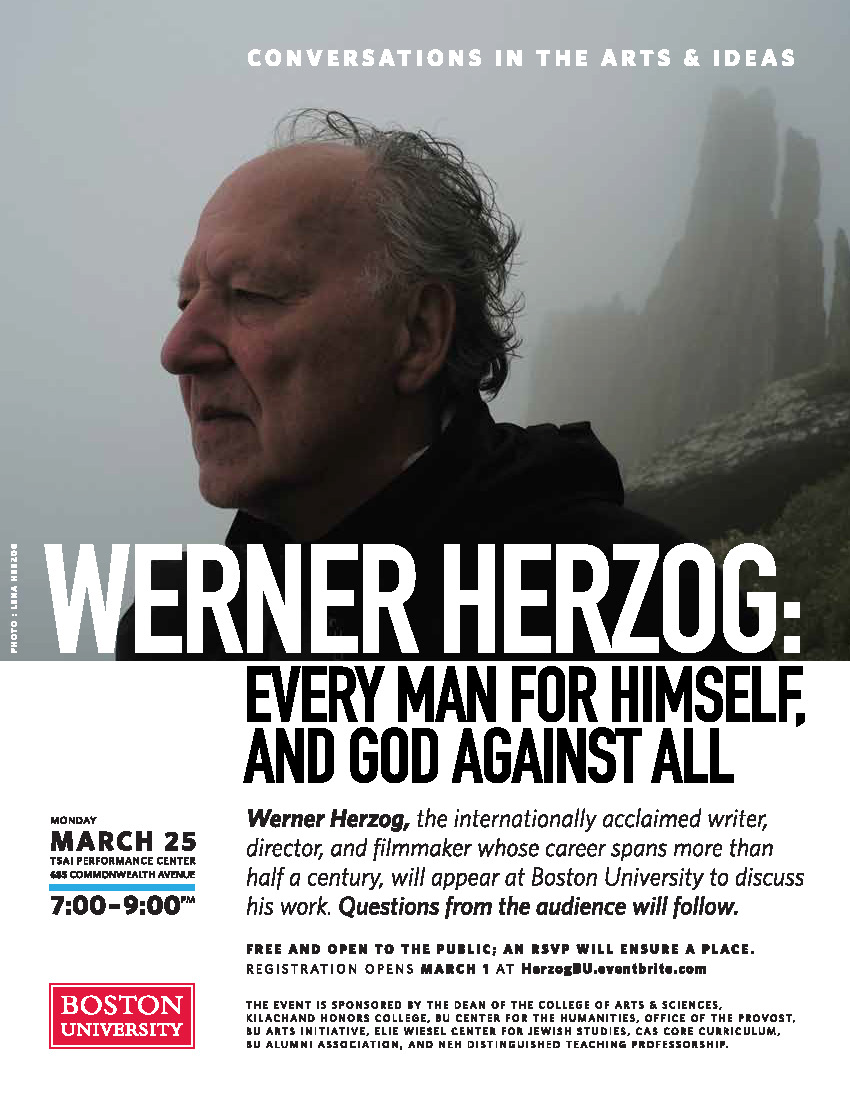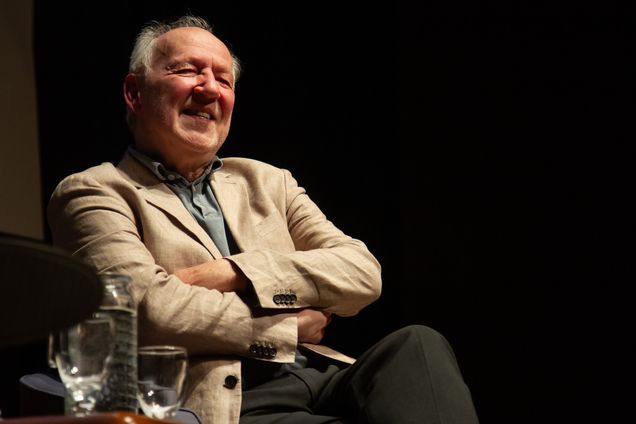
Acclaimed director, filmmaker, and writer Werner Herzog was the featured guest of the Boston University Conversations in the Arts & Ideas series on March 25, 2019, sharing his characteristically wide-ranging insights on aesthetics, film craft, philosophy, and humanistic inquiry to a captivated audience of BU community members at the Tsai Performance Center. In addition to this large gathering, Herzog continued the conversation over breakfast with BU undergraduates the following day.

The Arts & Ideas event at Tsai primarily took the form of a lively discussion between Herzog and Professor of Classical Studies Herbert Golder, whose longtime friendship and history of collaboration with the director resulted in an intimate, rigorous dialogue. “Herzog and Professor Golder had great rapport,” said Kimber Chewning, a PhD student in the History of Art & Architecture. “I don’t think the talk would have been nearly as entertaining or insightful if it hadn’t been a conversation between two close friends.”
“He is a visionary who gave us a vivid glimpse of the creative process, which in his experience is some combination of spontaneity, wide reading, boundless curiosity and openness, and a determination to follow his own artistic convictions,” reflected Professor of History James H. Johnson, one of the co-organizers of the event.
A particularly memorable way that Herzog shared this artistic vision with the audience came through the film clips and images that Herzog and Golder pulled from an extensive playlist made specifically for this event, adding to its organic and spontaneous quality. This not only provided a comprehensive view of Herzog’s filmmaking practice, but it allowed the audience to enjoy watching segments from some of Herzog’s most celebrated films—including Aguirre, the Wrath of God (1972), Invincible (2001), Wild Blue Yonder (2005), and Into the Inferno (2016)–all of which were contextualized by Herzog’s personal reflections on the films’ production and composition.
Engaging the audience in this sustained analysis provided surprising insight into Herzog’s filmography. “I grew up with his films (and our beloved, ancient, barely-running Volkswagen is named Herzog in his honor!), and often delude myself into thinking that I’ve seen the majority of them, but am always somehow delighted by the discovery that there are deeper cuts that I still haven’t yet had the chance to enjoy and think with” said Assistant Professor of History Benjamin Siegel.
PhD candidate in American and New England Studies Mariah Gruner remarked on the rare opportunity to watch the film clips alongside Herzog: “It felt a bit magical to watch Herzog watch his own work and then respond to it with mixtures of delight, frustration, and curiosity.”
Others were struck by Herzog’s willingness to speak directly, and at length, with audience members, many of whom were undergraduates seeking advice about filmmaking, or were curious to learn more about the director. Professor of English and Women’s, Gender, and Sexuality Studies, Director of Kilachand Honors College, and event co-organizer Carrie Preston noted, “Perhaps what most amazed me about the great filmmaker is his generosity of spirit with the students. One of my favorite moments in the lecture was when I said that we had time for just one more question and he determined, no, he would take the questions as quickly as possible! He was similarly warm and generous with the students at the breakfast the next day.”
In addition to speaking at length on the subject of filmmaking, Herzog spoke to the significance of other cultural forms. “Herzog stressed the importance of reading everything, a lesson I think is very important in our day and age of visualization,” said undergraduate Rona Moriah, CAS, English ’22. “The information he has acquired from books over the years has helped him explore the subjects of films he makes or will make.”
The event’s interdisciplinary form and participatory structure channeled Herzog’s humanistic impulse and emphasized the continued power of the humanities as tools of illumination, insight, and critique.